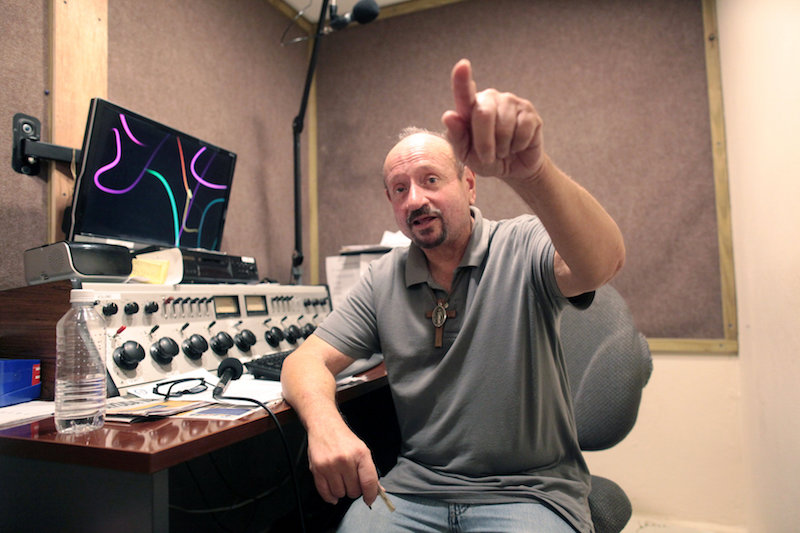
SAN JUAN, Puerto Rico, (Reuters) – News anchorman Luis Penchi has slept about three hours a night since Hurricane Maria turned his radio station into one of the few sources of public information on this battered island.
Working more than 25 hours straight during the height of the devastating storm, the lay Franciscan friar and grandfather has emerged as a light in the darkness for Puerto Rican listeners trapped in a virtual telecommunications blackout.
The powerful storm knocked out electricity, internet, television and cell service for the U.S. territory’s 3.4 million people. When other radio stations went dark, WAPA 680 kept plugging, delivering a 24-hour stream of news, advice, messages and pleas for assistance from listeners desperate to connect with loved ones.
Barefoot and wearing shorts and a wooden crucifix at the San Juan station on Wednesday, the bright-eyed Penchi credited retro technology for helping WAPA power through the maelstrom, along with some divine intervention.
“I believe it was an act of God. This is the chosen station,” the 62-year-old said with laugh.
In the days and hours since the storm broke, the Spanish-language station has become a cornerstone of news, sending out bulletins across the devastated U.S. territory about relief efforts, road conditions and missing people. In the words of one of its owners, Carmen Blanco, WAPA turned into the unofficial “voice of the government” about the hurricane.
With little working phone service, residents arrive in person at the station with messages to be read on the air.
Visitors have included a cardiac surgeon who made an appeal to locate the mother of a newborn baby girl in urgent need of heart surgery so the infant could be evacuated on a special medical flight to the United States. It worked. Relief workers tracked down the grateful mom.
WAPA got out the word that a nearby home for the elderly had run out of diesel for its generator. Listeners quickly responded with fuel, food and water. The station helped a kidney patient get a ride to a dialysis center, and it scored a coagulant medication for a woman within 45 minutes.
The public has taken notice.
“Those people are going to get some kind of award,” said Pablo Navarro, 74, a listener inspired by the coverage. “They held the whole place together. They were heroic.”
ANALOGUE RULES
Housed in a modest single-story beige block on the south side of the capital, the station sports an American flag on its logo.
Inside are echoes of an earlier age that for now is the norm in Puerto Rico. With power limited to the station’s generator, there is no air conditioning. Electronic frills have been reduced to the minimum. At the reception area, a woman wrote messages for broadcast on a typewriter.
Anchor Penchi credits such old-school resourcefulness for the station’s durability. He said WAPA stayed on the air because it had maintained its old analogue broadcasting capacity alongside its digital equipment.
Payam Heydari, an expert in radio technology at the University of California, Irvine, said basic analogue equipment tends to provide robust transmission over long distances. In comparison, he said, digital technology is highly dependent on electricity to power the relays needed to carry a signal.
“Therefore as soon as power goes down, so do the relays” on a digital signal, Heydari said.
Penchi joined WAPA last year. A veteran journalist, he returned to his native Puerto Rico from a Franciscan brotherhood in the United States to found a separate one on the island. Not long after, he also accepted an offer to work for the family-run commercial station.
The lay friar said a clergyman told him a time would come when Penchi “would be the only voice heard on the radio” in Puerto Rico. He said he laughed it off until Maria hit and he found himself one of the few voices left broadcasting on the island.
Penchi said he is still haunted by cell phone calls from people contacting the station for help from their rooftops as floodwaters rose, before the storm cut off communication.
“I heard the cries of the people calling in live on air,” he said.
Since then, Penchi and his coworkers have done all they can to provide relief to the suffering using the power of their radio signal. Local journalists have stepped in for free to ease the workload on weary WAPA anchors. Other professionals have pitched in too.
The day after the storm, WAPA put out a call for psychologists to come speak with distressed listeners arriving at the station frantic to contact loved ones.
Julio Herran, 44, volunteered. He said he has been there ever since, working as long as 15 hours a day lending an ear and doing his best to comfort the anguished.
“I make them realize they are OK. They are fine,” he said. “Then we write a message to put on the radio.”
